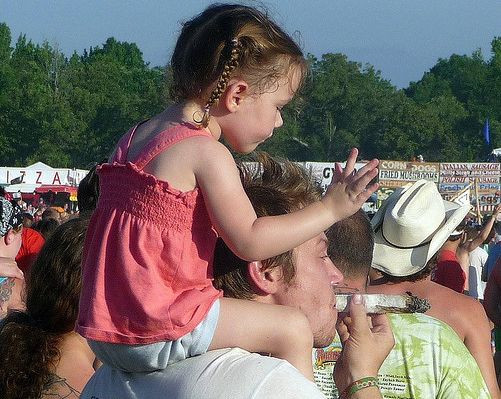After Legalization, Marijuana Poisoning Increases Amongst Colorado Kids

Unintentional marijuana ingestion rose among kids in Colorado in the months after new federal guidelines were implemented in 2009, according to a new study in JAMA Pediatrics. The findings suggest stronger regulations or heightened awareness are needed when medical marijuana products are used around children.
Medical marijuana has been legal in Colorado for 13 years, but it wasn't widely used until 2009, when the U.S. Justice Department relaxed its guidelines on prosecuting suppliers and consumers. That year alone, sixty thousands new medical marijuana cards were issued, compared to 2,000 during the eight years prior.
Many cardholders, however, don't enjoy smoking weed because of the harsh effects it can have on the lungs, and recently marijuana-infused foods and drinks have become popular. At the Colorado-based store "Bakked", these edibles range from the classic brownie to lollipops, and pot-laced soft drinks have surfaced along the coasts of California.
Childproof containers and warning labels about juvenile exposure are not currently required for medical marijuana products. Given pot-laced edibles resemble foods that are attractive to children, researchers in Denver wondered if kids in their state were at risk for unintentional marijuana ingestion.
"The impact that decriminalizing medical marijuana has had on the use of marijuana is unclear," wrote Dr. George Wang and his colleagues. "Although one study found higher adolescent marijuana use in medical marijuana states, a second study found no effect. Neither study included younger pediatric exposures."
The study reviewed the emergency room records from a Denver-area children's hospital, dating between 2005 and 2011. While zero incidents occurred before the Justice Department's 2009 decision, 14 kids were visited this ER because of unintentional marijuana consumption in years following.
The majority — 85 percent — were under the age of 5, and the youngest was 8 months old. Two of the exposed children required intensive care.
"The finding reignites the debate over whether and how legalized marijuana impacts children and adolescents," wrote pediatrician Sharon Levy from Harvard University. She highlights that pot use amongst adolescents is climbing rapidly, due to a growing perception in the national conversation that marijuana is harmless.
Marijuana-laced cookies, cakes, and candy were implicated in 50 percent of the occurrences. Cooking THC, the pain-relieving ingredient in pot, can diminish its effects, so these products are often packed with larger amounts of the substance. These products work well for cancer patients in search of pain relief, but can be dangerous when used by children and adolescents.
The researchers conclude that the decimalization of medical marijuana along with relaxed prosecution increased the liklihood of marijuana exposure in young children from Colorado.
"The consequences of marijuana exposure in children should be part of the ongoing debate on legalizing marijuana," wrote Dr. Wang and his co-authors, who recommend that childproof containers and warning labels be applied to medical marijuana products to safeguard this emerging industry.
Source: Wang GS, Roosevelt G, Heard K. Pediatric Marijuana Exposures in a Medical Marijuana State. JAMA Pediatrics. 2013.



























